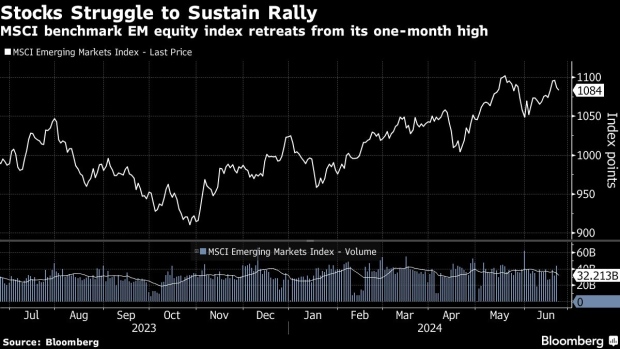
(Bloomberg) — The Colombian peso led a gauge of emerging-market currencies higher Monday as appetite for riskier assets picked up with the greenback poised for its worst day in more than five weeks.
Latin America’s assets are broadly rebounding as optimism over looser monetary policy in the world’s largest economy outweighed fiscal concerns in Brazil, Colombia and Mexico. An index of the region’s stocks is also up, even as a broad gauge of developing-world equities was dragged lower by worries over China’s economic outlook.
The advance is a sharp turn for Latin American assets, which have been rocked by policy and fiscal uncertainty in June after months of relative stability. The Mexican peso was higher, trimming the month’s loss as volatility dwindles after President-elect Claudia Sheinbaum picked some market-friendly cabinet members. All eyes are on the central bank ahead of Thursday’s rate decision, the first since the leftist party’s sweeping electoral victory, and as inflation accelerated more than expected in early June.
“In a world where we see lower volatility, Latin America is the place for carry,” said Luis Hurtado, a currency strategist at CIBC. “I don’t think that the favorable environment we saw for carry trades over the last three year is going to be present in the third quarter.”
Traders are awaiting a string of Federal Reserve speakers Monday after Austan Goolsbee of the Chicago Fed said it may be appropriate to start thinking about whether policy is putting too much pressure on the economy. The dollar was on track for a 0,2% daily decline, the worst since May 15. The gauge has posted five straight weeks of gains.
The EM currency index is up for the first time in three session as liquidity improved in global markets following a holiday in the US last week. Money managers will also watch US gross-domestic product data this week as well as policymaker’s preferred gauge for consumer prices for fresh clues about the path for US rates.
Hungary’s forint and Poland’s zloty also outperformed, while the South African rand bucked the trend amid protracted talks to form a new government.
Elsewhere, dollar bonds from Ukraine rallied after European Union member states agreed on a plan to send Ukraine €1.4 billion euros ($1.5 billion) in military aid from the windfall profits of frozen Russian assets.
In Africa, Ghana’s bonds were lower across the curve despite news the nation reached an agreement in principle with Eurobond investors to restructure about $13 billion of its debt. Ethiopia’s creditors, meantime, are ready to extend a June 30 deadline for the country to reach a deal with the International Monetary Fund on a new program, according to a person with direct knowledge of the discussion.
A second round of talks between Sri Lanka and its bondholders is expected to kick off this week, people familiar with the matter said.
Stocks
A index of stocks listed in Shanghai wiped out year-to-date gains as investors’ sentiment continued to sour about a weak macro-economic outlook. In Asia, a selloff in tech shares continued Monday, with Taiwan Semiconductor Manufacturing Co. falling more than 3%.
Traders will turn their focus to the third plenum for top Chinese leaders in July for potential supportive policies. The fiscal revenue in the world’s No. 2 economy shrank at the fastest pace in more than a year, fueling expectations that the government could make another rare mid-year budget revision to aid an economic recovery.
©2024 Bloomberg L.P.


